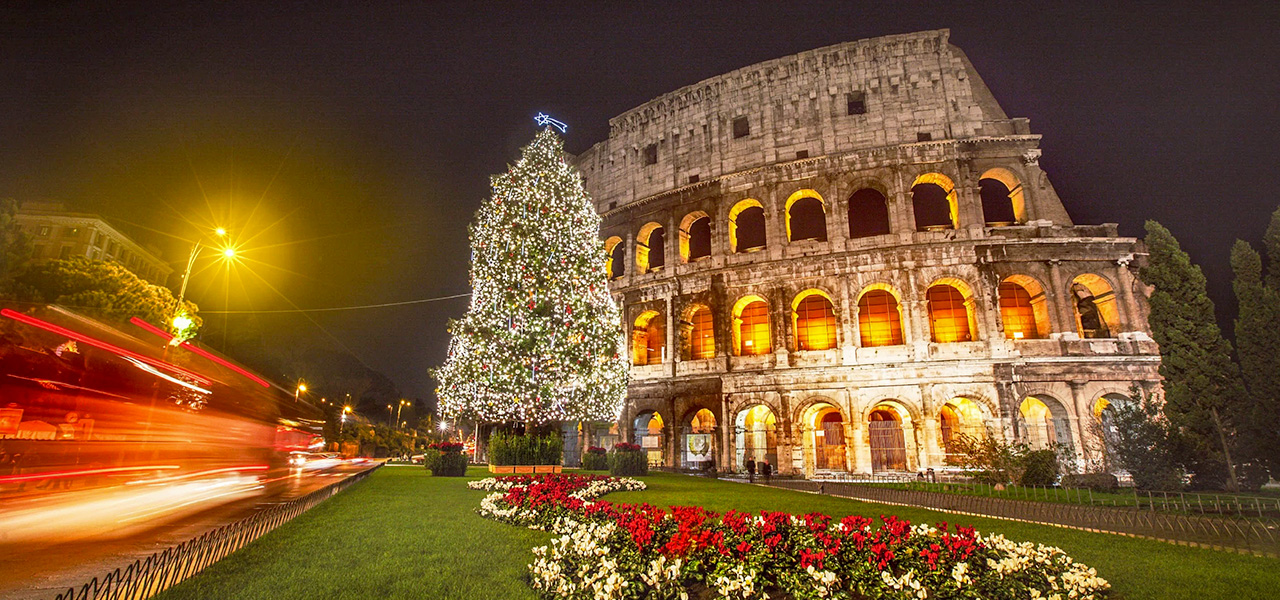If you have planned a winter vacation in Rome, but have not yet made special plans for Christmas, a concert in the magnificent Teatro di Palazzo Santa Chiara is an unmissable opportunity. Featuring a collection of the most famous opera arias, performed by I solisti dell’opera opera di Roma. An Ensemble consisting of a String Quartet and two voices: a Soprano and a Tenor. This performance will get you into the spirit of the season!
For your pleasure, the Concerts are held several times during the Christmas season so that you can plan to attend at least one of the evenings. The program includes famous pieces from popular operas by Italian masters such as Verdi and Puccini. The arias and duets will once again captivate you with the beauty and elegance of their melodies, while the accompaniment of the four violins will allow you to enjoy music in its purest form.
Before the Christmas Concert, enjoy an aperitivo and relax before listening to the music of Italy’s greatest composers. Experience the true meaning of romance with the music and love songs of Verdi, Puccini, and Rossini. On the way out, from the historic building in the center of Rome, just 100 meters away is the Pantheon that will fill your heart with Roman sights.
The Concert begins at 7:30 pm. The performance lasts about 60 minutes, with no intermission. The venue is fully wheelchair accessible and there is no formal dress code. This Christmas, make your trip to the Eternal City unforgettable with this special performance!
What works are trending at Christmas time?
There are many operas whose central theme is the Nativity of Jesus or secular Christmas stories and some contain more or less direct references to Christmas.
The earliest Christmas operas appeared in the early 17th century and they were mainly based on religious themes relating to the Nativity. One of the earliest Christmas operas of this type was Giovanni Battista da Gagliano and Jacopo Peri‘s Il gran natale di Christo salvator nostro (The Great Nativity of Christ, Our Saviour), first performed on Christmas Day 1622.
By the mid-19th century the ban on secular operas during Advent ceased, and operas based on a wider array of Christmas themes, such as Santa Claus, Knecht Ruprecht, or King Wenceslaus emerged. Nikolai Gogol‘s short story Christmas Eve has been the inspiration of three Russian language operas: Tchaikovsky’s Vakula the Smith (1876) and its revised version Cherevichki (1887), and Nikolai Rimsky-Korsakov’s Christmas Eve (1895). At least nine Christmas operas have been based on Charles Dickens‘s novella, A Christmas Carol, including those by Bernard Herrmann (1954), Lino Liviabella (1966) and Thea Musgrave (1979).
Les cadeaux de Noël (The Christmas Gifts), composed by Xavier Leroux to a libretto by Émile Fabre premiered on 25 December 1915 at the Opéra-Comique in Paris. Das Christ-Elflein (Christ’s Little Elf), composed by Hans Pfitzner to a libretto by Pfitzner and Ilse von Stach, premiered on 11 December 1917 at the Königlich-Sächsisches Hoftheater in Dresden.
The story of the Magi has also been the basis of several operas, including Gian Carlo Menotti’s 1951 opera “Amahl and the Night Visitors”. Initially written for television performance, Menotti’s opera has become the only modern Christmas opera to earn an enduring place in the live opera performance repertoire. Several 21st century composers have attempted to create a popular Christmas work for the opera medium, including Mark Adamo whose Becoming Santa Claus was well received at the Dallas Opera in December 2015. Also successful is John Adams‘ Christmas opera-oratorio El Niño (2000) which has been semi-staged by several opera companies and orchestras internationally. Of further importance is Kevin Puts’ Pulitzer Prize winning opera Silent Night (2011).
While not based on Christmas themes, some operas based on fairy tales or nursery rhymes such as Massenet’s Cendrillon, Humperdinck’s Hansel and Gretel, and Victor Herbert’s Babes in Toyland have been traditionally performed during the Christmas season. Puccini’s La bohème, whose first two acts take place on Christmas Eve, is also often presented during the Christmas period.


